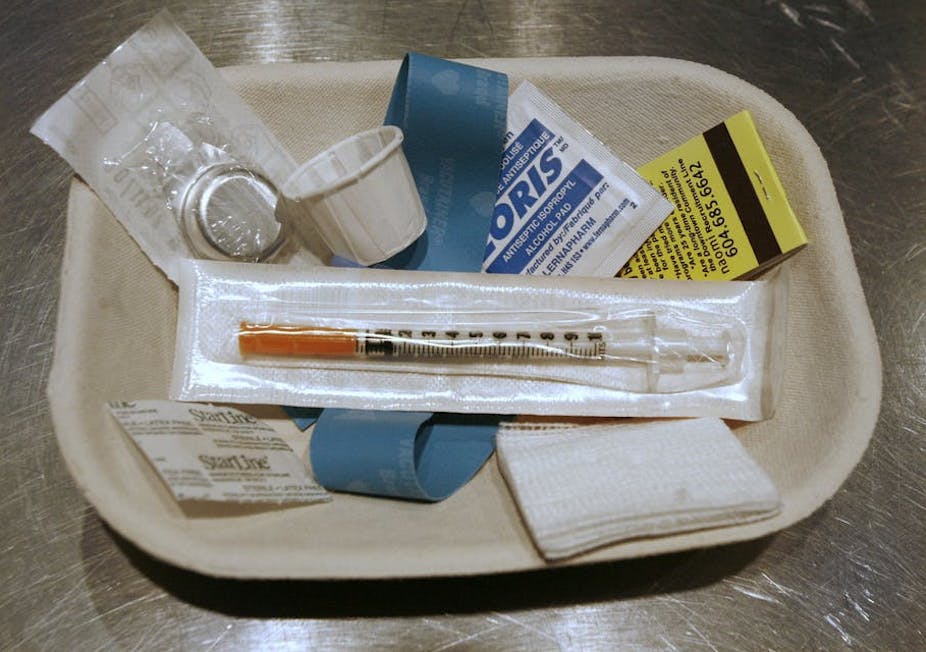Urgent action is needed to stem the UK’s overdose crisis, according to a group of cross party MPs, who have called upon the government to properly tackle the issue. Drug-related deaths rose to record numbers in 2018 in England and Wales. A total of 4,359 people died due to drug poisoning – over half of them related to opiate use.
MPs have urged for a number of important policy changes. These include the decriminalisation of drug possession for personal use and the the creation of supervised injecting facilities.
Supervised injecting facilities – sometimes known as overdose prevention centres or drug consumption rooms – are a critical tool in ending the overdose crisis. These are places where people are allowed to inject illegal drugs in hygienic conditions in the supportive presence of medical staff and peer workers.
They are primarily intended to provide services for vulnerable, poor or homeless people who would otherwise inject in public places – such as alleys or parks. Circumstances that significantly increase the risk of fatal overdose and transmission of blood borne infections via unsterile injecting equipment
According to the nongovernmental organisation, Harm Reduction International, which monitors global developments on programmes to reduce drug-related harms, there are almost 120 such facilities operating in 11 countries. This includes Canada, Australia, France and the Netherlands. And research by the European Monitoring Centre on Drugs and Drug Addiction found that supervised injecting sites help to reduce unsafe injecting and fatal overdoses.
Outdated logic
Yet despite the record of success of safe injecting facilities too many governments continue to oppose their implementation. Over the summer, Dublin City Council refused planning permission to open Ireland’s first safe injecting room. This despite the Irish government changing the law two years earlier to clear legal barriers to their operation.
In Canada in 2011, the Conservative government of Stephen Harper went all the way to the Supreme Court to try to shut down the country’s first safe injecting facility in Vancouver. Only to have the government lose in humiliating fashion in a unanimous decision. Yet despite the court ruling in favour of safe injecting facilities, some provinces continue to obstruct their implementation.
In the US earlier this month, health advocates won an important legal victory when a District Court judge blocked an attempt by the US Justice Department to prevent the nation’s first legal supervised injecting facility from opening its doors in Philadelphia. The Justice Department sought to have the not-for-profit project, Safehouse, declared unlawful under a 1986 federal law intended to shut down “crack houses”.
Lifesaving programmes
But not all efforts end in victory. In the UK in December 2016, the Advisory Committee on the Misuse of Drugs – the government’s expert body – recommended implementing safe injecting facilities in response to massive increases in overdose deaths. But in July 2017, the government of Theresa May rejected this recommendation. And four months later the Lord Advocate in Scotland blocked plans by the City of Glasgow to open the UK’s first safe injecting facility.
The Conservative government has even blocked the appointment of experts known to be supportive of these lifesaving programmes. In July 2019, it emerged that the CEO of the drugs charity Release, Niamh Eastwood, had her appointment to the the Advisory Committee on the Misuse of Drugs blocked by the Home Office. Her crime? Tweeting criticism of the government’s rejection of the recommendation for safe injection facilities in 2017.
Earlier this month, a leading UK drug expert, Alex Stevens of the University of Kent, resigned his seat on the the Advisory Committee on the Misuse of Drugs citing “political vetting” of appointments by the Home Office. Stevens said “if suitably qualified experts are excluded from membership on the basis of stated disagreements with government policy, this will erode the quality of advice that the Advisory Committee on the Misuse of Drugs can give”.
Human rights crisis
Since the 1970s, and the start of the “war on drugs”, punishment, policing and prisons, rather than health, became the core approach of drug policy. Alongside this has been an escalation of human rights violations linked to drug control. Denial of life saving programmes, such as safe injecting facilities, is but one example.
As I highlight in my book, in recent years we have examples of courts stepping in to defend the rights of people who use drugs against the excesses of government drug warriors. And the publication earlier in 2019 of International Guidelines on Human Rights and Drug Policy marks a significant milestone in this slow process of reform.
Following the US court decision, a supporter of Safehouse described it as “a resounding defeat for Donald Trump and his minions’ callous efforts to increase the suffering of people and communities struggling with addiction”. With the UK experiencing the highest levels of drug-related deaths in history, how much more suffering and death will people who use drugs have to endure before the callous efforts of the UK government come to an end? Indeed, the quick and negative response of the government to the MPs call for health-centred drug reforms seems to suggest the overdose crisis will continue to escalate.

